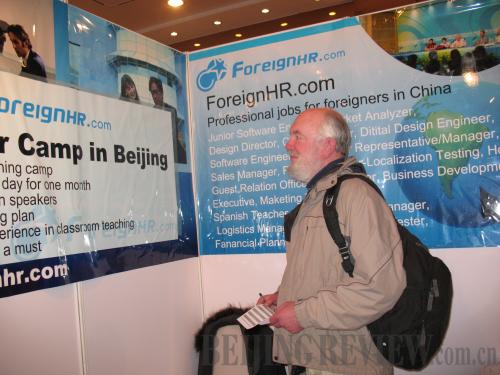|
 |
|
JOB HUNTER: A foreigner looks for a job at an employment fair held this November in Beijing. The number of foreigners working in China continues to increase on a yearly basis (COURTESY OF FOREIGNHR.COM) |
Forty-four-year-old Daniell Goodin has spent almost two decades working abroad, calling Indonesia, Hong Kong and the United States "home" for different periods of time. In May, the Australian native arrived in China, working as a marketing and customer relations manager responsible for the domestic and international sales of products for Tianjin Talent Chemistry Co. Ltd.
As a veteran of living abroad, Goodin adapted to his new Chinese job quickly, establishing and maintaining client relationships across the globe and taking business trips to the company's branches nationwide. But what makes Goodin's stay in China particularly interesting is his fascination with ancient Chinese tactician Sun Tze, author of The Art of War.
"The book inspired me, showing how important the psychology of changing people's mind in doing business can be," said Goodin.
The Chinese staff at Talent Chemistry speak highly of their foreign colleague, especially Goodin's strong competence and assistance with improving the company's marketing strategy, Zhang Zhen, one of Goodin's co-workers, said.
But Goodin is not alone in adding diversity to workplaces across China. In the past three years, the number of foreigners working in China has increased dramatically, said Eric Liu, CEO of ForeignHR.com, a Beijing-based recruitment website exclusively for foreigners.
At the end of 2003, almost 90,000 foreigners had been officially employed in China with legitimate work permits, said Gao Lin, a director at the Ministry of Human Resources and Social Security. According to the latest figures released by the ministry, the number of officially employed foreigners has increased to 217,000 foreigners till the end of last year, an increase of 7,000 persons from 2007.
The total number of foreigners working in China is probably closer to 700,000 in 2009, since many foreigners seek employment using tourist or business visas instead of legitimate work permits, said Liu.
But Chinese companies are not surprised by the surge of foreign interest to work in China. As more Chinese enterprises expand into the global market, there are increasing job opportunities for foreigners, said Liu.
Earning bread abroad
Walking through Beijing's vibrant Central Business District (CBD), Hashiguchi Izumi, a 33-year-old Japanese woman, fits in nicely with the average Chinese white-collar urbanites, not just in appearance but language as well—she speaks fluent Chinese.
When Hashiguchi came to Beijing in 2002 to continue her Chinese language education, starting a life in the Chinese capital was not in her immediate plans. A half year later, the Japanese native landed an editing job with a local advertising company.
"I love this job. In Japan, the economy is not as booming as it is here. It would have been too difficult to find an editing job," Hashiguchi said.
Currently, Hashiguchi is the head of the editing office for the Japanese language magazine Super City, distributed to Japanese residents in Beijing. In charge of the magazine's editing process, she has been labeled a "workaholic" by her Chinese colleagues.
"I truly cherish my job here. If I were back in Japan, I could not realize my dreams," she said.
As one of the few foreigners in her company, Hashiguchi was forced to practice her Chinese on a daily basis. As a result, her Chinese speaking ability has improved significantly, she said.
And although paid about as much as a newly graduated Japanese university student, Hashiguchi still finds her work satisfying, as the cost of living in China is much lower.
"In China, the work pace is much slower than it is in Japan," she said. "The work atmosphere is also less stressful."
Opportunities to contribute to the inner workings of the company and offer her opinion are also more abundant, Hashiguchi said.
"In Japan, I wouldn't dare to express my own ideas, but here I can speak directly to my boss and offer suggestions for future projects," she said. "I even joke with my boss."
| 